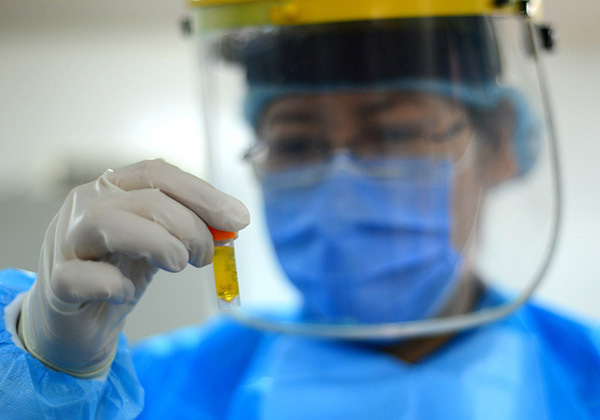Chinese scientists claim possible breakthrough in HIV, hepatitis cure
Updated: 2016-08-08 12:55
By Guo Kai(chinadaily.com.cn)
|
|||||||||
 |
|
A technician carries out a blood test for HIV virus at Jinan AIDS lab in East China's Shandong province in this file photo. [Photo/IC] |
There's now hope at the end of the tunnel for patients with chronic viral infections, such as HIV and hepatitis B.
According to an article published online by Nature magazine, Chinese scientists have identified a unique subset of virus-specific CD8+ T cells playing a pivotal role in the control of viral replication during chronic infection.
Ye Lilin, a professor from the Third Military Medical University in Chongqing and a co-author of the article, said that the CD8+ T cells kill infected cells and secrete antiviral cytokines to effectively clear the virus in the acute infection.
During the chronic viral infection, the CD8+ T cells become exhausted, exhibiting poor effecter function and lose memory ability, Ye said, who is working under a national program launched in 2013. "The number of CD8+ T cells does not drop, but it seems like police stop fighting with criminals."
However, though the exhausted cells seem to lose the function of getting rid of the virus, scientists found that they still contain viral replication in chronic infections to keep the amount of virus at a low level.
Scientists discovered that a subset of exhausted CD8+ T cells expressing the chemokine receptor CXCR5 plays a critical role in the control of viral replication in mice that were chronically infected with lymphocytic choriomeningitis virus.
Scientists called the subset as CXCR5+ CD8+ T cells that were preferentially localized in B-cell follicles, expressed lower levels of inhibitory receptors and exhibited more potent cytotoxicity.
Scientists identified the Id2/E2A axis as an important regulator for the generation of the CXCR5+ subset.
Currently, chemical drugs can only restrain the viral replication to some extent, but not clear the virus in treating patients of HIV, hepatitis B and cancers.
Ye said the new findings would allow researchers to find certain measures to improve and stabilize the function of CXCR5+ CD8+ T cells to clear the virus, offering possibility of curing these diseases.
Related Stories
Dating app for HIV patients a good match for those seeking love 2016-08-02 08:13
Swindlers of people with HIV and those leaking their info must be punished 2016-07-19 07:45
HIV/AIDS patients fall prey to identity-leak scam 2016-07-19 07:29
Microbiome disruptions may explain HIV-exposed babies' poor health: study 2016-07-28 14:28
Phone fraudster targeted HIV patients using leaked information 2016-07-18 10:13
Joint WHO-UNAIDS Statement on HIV information leak 2016-07-18 19:25
Today's Top News
Leaders of Iran, Azerbaijan seek to boost trade
Storm in Macedonia kills at least 17
Bank of England cuts rates to record low, restarts QE
Chinese tech to make Himalayan train possible
London unveils new anti-terror unit amid knife attack
Woman killed, five injured in London knife attack
Fury at Republican Party over Trump snub of Ryan
Ukraine's Savchenko on hunger strike
Hot Topics
Lunar probe , China growth forecasts, Emission rules get tougher, China seen through 'colored lens', International board,
Editor's Picks

|

|

|

|

|

|







